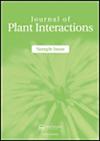转录组分析揭示了芒果(Mangifera indica L. cv.)的低温反应基因。Keitt)叶
IF 3.3
3区 生物学
Q2 PLANT SCIENCES
引用次数: 1
摘要
本文章由计算机程序翻译,如有差异,请以英文原文为准。
Transcriptome analyses revealed chilling response genes in mango (Mangifera indica L. cv. Keitt) leaf
ABSTRACT Mangifera indica L. cv. Keitt is a cold-stress fruit plant native to China's drought river valley. Chilling stress affects productivity. Understanding the mechanisms of chilling stress is important to increasing chilling resistance in mango. Leaves of Keitti were subjected to 4 °C for 0, 3, 6, and 9 h for RNA-Seq-based transcriptome analysis, respectively. The chlorophyll content, carotenoid content, catalase, and peroxidase activities significantly increased during 9 h. The leaves responded to the stress by enhancing photosynthetic pigment content and antioxidant enzyme activity. After 3 h of chilling, 410 genes were differentially expressed. WRKY70 and PLD1 were significantly up-regulated after 9 h. Compared to 9 and 0 h, there were 1123 DEG. The DEGs are enriched in hormonal signal transduction, secondary metabolites, and the abiotic stress response. Similarly, the transcriptional factor families including NCED2, MYB73, and HLH162 up-regulated. The study will promote research on the development of chill-resistant mangoes.
求助全文
通过发布文献求助,成功后即可免费获取论文全文。
去求助
来源期刊

Journal of Plant Interactions
PLANT SCIENCES-
CiteScore
5.30
自引率
6.20%
发文量
69
审稿时长
>12 weeks
期刊介绍:
Journal of Plant Interactions aims to represent a common platform for those scientists interested in publishing and reading research articles in the field of plant interactions and will cover most plant interactions with the surrounding environment.
 求助内容:
求助内容: 应助结果提醒方式:
应助结果提醒方式:


